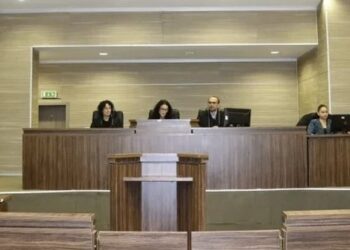By Boldnews.al
Official documents show that Arta Vorpsi and Elsa Toska, two candidates for the Constitutional Court, did not receive the points needed for students to enroll in the School of Magistrates.
Vorpsi and Toska, two legal advisers to the Constitutional Court, were involved in a trial by the School of Magistrates in May 2018 along with over 45 other legal aides in law institutions, including the Supreme Court and the Attorney General.
The testing was organized in accordance with the provisions of the Veting law, according to which legal assistants achieving a minimum of 60 points, as well as successfully passing the reassessment process, were able to obtain the status of magistrate.
Attorneys Arta Vorpsi and Elsa Toska received 56 and 57 points, respectively, lower than the minimum 60-point limit out of a possible 100 required for admission to the Graduate School of Magistrates.

Official test result developed by the School of Magistrates for the subjects Elsa Toska and Arta Vorpsi
However, the two legal advisers have taken the decision of the Council of Justice Appointments (KED) to pursue vacancies in the Constitutional Court, calling into question the procedures followed for their evaluation.
Boldnews.al, which has previously reported on this situation with reference to newsroom sources, has already provided official information on the test results, based on a request for information to the School of Magistrates.
Testing
The Director of the School of Magistrates, Sokol Sadushi, in reply to “BN” informs that the legal advisors Arta Vorpsi and Elsa Toska (as well as their colleagues in other institutions) are involved in the special testing for professional skills, consisting of two phases. – the first stage is electronic testing and the second stage is the professional one.
 At the conclusion of the test, “Arta Vorpsi candidate received 56 points in electronic testing and 145 points in professional testing. Whereas the candidate Elsa Toska received 57 points in the electronic test and 153 points in the professional one ”, informs Sadushi.
At the conclusion of the test, “Arta Vorpsi candidate received 56 points in electronic testing and 145 points in professional testing. Whereas the candidate Elsa Toska received 57 points in the electronic test and 153 points in the professional one ”, informs Sadushi.
It also states that “the purpose established by law… (for testing, red.) Is not to give a decisive role only to professional testing, but to assist the reassessment bodies… to assess the professional skills of the subject. ex officio reassessment of the results of professional testing as well as of the work performed by them in the institutions where they work ”.

Following this legal explanation, Sokol Sadushi states that “the final conclusion on the level of professional competence of ex officio subjects is not made by the School of Magistrates, but is and remains a legal obligation of the re-evaluation bodies” (Veting).
Minimum points
Section 25 of the School of Magistrates Regulation provides for the manner of assessment of the test for ex officio subjects (including legal advisors of the Constitutional Court), as well as the minimum score for passing the exam.
“In the first phase, the electronic test thesis … is rated at a maximum of 100 points and has the same structure and the same rating as the acceptance test thesis for the candidates for magistrates …” states paragraph 4 of this article. Whereas “in the second phase, the professional test…. up to a maximum of 200 points ”.

Regulation of the School of Magistrates for ex-officio subjects
Always in accordance with the provisions of the Regulation, “Subjects… who have received at least 60 points in electronic testing and over 60 percent of professional testing points, and after receiving confirmation from re-evaluation institutions, are eligible to pursue the two-year program. of theoretical training and professional practice in the School of Magistrates ”.
On the basis of these determinations, it is clearly established that the first stage of testing is the same as that applied to new students of the School of Magistrates, including the required minimum qualification threshold of 60 points.
Exactly, based on these predictions, the subjects Arta Vorpsi and Elsa Toska would not have been admitted to the School of Magistrates if they had run as students because they received less than the minimum score.
Referring to the test results, Vorpsi and Toska achieved the required scores (over 60%) of the second phase of testing. However, the Regulations of the School of Magistrates stipulate that candidates ex officio, in order to develop a 2-year training course at its place, must cumulatively achieve “at least 60 points in the first phase and at least 60% of points in the second phase ”.
As lawyers Arta Vorpsi and Elsa Toska do not meet either of these conditions, that of the first phase, they are excluded from the opportunity to pursue a 2-year course at the School of Magistrates, to obtain a Master’s degree and to obtain a Master’s degree. exercising functions in the court or prosecutor’s office of first instance.
But, ironically, the Council of Justice Appointments (KED) has qualified the two lawyers as potential candidates for the highest-level election in Albania’s justice system to the Constitutional Court.
Vetingu
Testing conducted by the School of Magistrates, although crucial for new judges and prosecutors, does not play a role in the re-evaluation process and in the selection of candidates for senior institutions of the justice system.
Legal adviser Elsa Toska, an official candidate for member of the Constitutional Court, was confirmed in office in February 2019 after the Independent Qualification Commission (KPC) assessed it positively on three criteria, including professional.
In the whitewashed decision on the Toska subject, the Vetering body, composed of chair Valbona Sandzaktari, rapporteur Genta Bungo (Tafa) and member Lulzim Hamitaj, expresses only with one paragraph that “… the subject, in the first stage, achieved 57 points from 100 in total, while in the second phase he managed to get 153 points out of 200 in total… ”. The decision has no in-depth analysis of the test result.

The result of the second phase of testing at the School of Magistrates for the subject Elsa Toska
The same body, made up of Hamitaj, Sandzaktari and Bungo, has only handled the case of another legal adviser, also a candidate for the Constitutional Court, Arta Vorpsi, with changed roles.
In the Vorpsi affirmation decision, the Vetting trio, assessing for their professional abilities, also expresses only one sentence and no emphatic analysis of the test result: “… It is found that the subject, in the second phase of this test, part of the professional evaluation, managed to get 145 points out of 200 in total ”.

The result of the second phase of testing at the School of Magistrates for the subject Arta Vorpsi.
Arta Vorpsi and Elsa Toska are already official candidates for the Constitutional Court vacancies after they qualified with the July 2019 Appointments to Justice Council decision.














